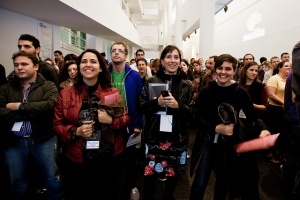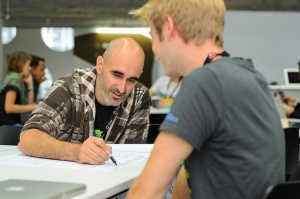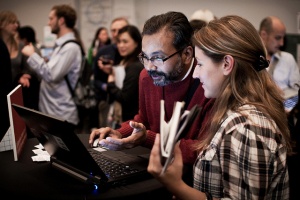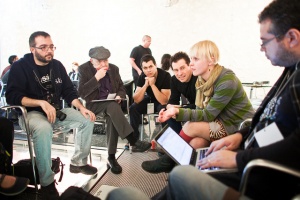Festival2012/Submit: Difference between revisions
| (15 intermediate revisions by 10 users not shown) | |||
| Line 58: | Line 58: | ||
== Proposed sessions == | == Proposed sessions == | ||
* ''Example: [https://wiki.mozilla.org/Festival2012/Submit/ | * ''Example: [https://wiki.mozilla.org/Festival2012/Submit/LiveCodeLab title here]'' | ||
* [https://wiki.mozilla.org/Festival2012/Submit/CubicVR Developing WebGL games and applications with CubicVR.js] | |||
* [https://wiki.mozilla.org/Festival2012/Submit/LiveCodeLab Fun with livecoding on the web: LiveCodeLab] | |||
* [https://wiki.mozilla.org/Festival2012/Submit/5_Myths_About_Contributing 5 Myths about Contributing] | |||
* [https://wiki.mozilla.org/Festival2012/Submit/https://wiki.mozilla.org/Festival2012/Submit/Create_A_Powerful_Responsive_Site_And_Prototype_With_Foundation Create A Powerful, Fully-Responsive Site and Prototype with Foundation] | |||
* [https://wiki.mozilla.org/Festival2012/Submit/5_Myths_About_Contributing 5 Myths about Contributing] | * [https://wiki.mozilla.org/Festival2012/Submit/5_Myths_About_Contributing 5 Myths about Contributing] | ||
* [https://wiki.mozilla.org/Festival2012/Submit/Jobseekers_as_Webmakers Jobseekers as Webmakers] | * [https://wiki.mozilla.org/Festival2012/Submit/Jobseekers_as_Webmakers Jobseekers as Webmakers] | ||
| Line 132: | Line 136: | ||
* [https://wiki.mozilla.org/Festival2012/Submit/OpenBadges_Backpack_UserTesting Open Badges Backpack User Testing] | * [https://wiki.mozilla.org/Festival2012/Submit/OpenBadges_Backpack_UserTesting Open Badges Backpack User Testing] | ||
* [https://wiki.mozilla.org/Festival2012/Submit/ZombiesRun Zombies, Run! Technology in iOS and Android development] | * [https://wiki.mozilla.org/Festival2012/Submit/ZombiesRun Zombies, Run! Technology in iOS and Android development] | ||
* | * [https://wiki.mozilla.org/Festival2012/Submit/Badging_Our_Story_So_Far Badging: Our Story So Far] | ||
* [https://wiki.mozilla.org/Festival2012/Submit/Remix_games_with_Craftyy Remix games with Craftyy] | |||
* [https://wiki.mozilla.org/Festival2012/Submit/Play-My-Code Build browser games with Play My Code] | |||
* [https://wiki.mozilla.org/Festival2012/Submit/Game_design_is_system_hacking Game Design is System Hacking] | |||
* [https://wiki.mozilla.org/Festival2012/Submit/Build_hackable_games Build Hackable Games] | |||
* [https://wiki.mozilla.org/Festival2012/Submit/Meet_the_Mozfest_Young_Reporters Meet the Mozfest Young Reporters] | |||
* [https://wiki.mozilla.org/Festival2012/Submit/Design_a_graphic Design a graphic with text using khan and html with thimble] | |||
* [https://wiki.mozilla.org/Festival2012/Submit/Designing_OpenBadges_in_the_wild Designing Open Badges in the wild] | |||
* [https://wiki.mozilla.org/Festival2012/Submit/Build_a_CodeCards_mission Build a tactile learning tool with CodeCards] | |||
* [https://wiki.mozilla.org/Festival2012/Submit/Paper-prototype_socially_responsive_games_with_verbs Paper-prototype socially responsive games with verbs] | |||
Latest revision as of 23:31, 4 November 2012
Mozilla Festival 2012: Submit a Proposal
A yearly festival with hundreds of passionate people exploring the Web, learning together, and making things that can change the world.
Making, Freedom and the Web
November 9 - 11, 2012 | #mozfest
London, UK | Ravensbourne
This wiki page will explain how the Mozilla Festival works and you can propose activities.
Deadline Sept. 15
Table of Contents
How to propose a session or activity
1. Answer these questions
* Title of session:
* Your name and affiliation:
* Session format: (select Design Challenge, Learning Lab, or Fireside Chat)
===What will your session or activity allow people to make, learn or do?===
===How do you see that working?===
===How will you deal with 5, 15, 50 participants?===
===How long within your session before someone else can teach this?===
===What do you see as outcomes after the festival?===
2. Post responses on the wiki
I. Create an account on the Mozilla wiki.
- If you're not able to use the wiki, please email sessions@mozilla.org directly with your responses.
II. Start a new wiki page with your session title.
- The URL should have the prefix Festival2012/Submit/ and then your session title.
- For example: https://wiki.mozilla.org/Festival2012/Submit/Touch_the_news
III. Copy & paste the questions above onto your new wiki page.
IV. Add a link to your wiki page in Proposed Sessions below.
- See examples below.
V. Email sessions@mozilla.org when you're done
- Let us know about your proposal. We'll be in touch!
- Feel free to return to your wiki page and keep editing.
Notes:
- Please read through the rest of the info on this page.
- This process is all hackable. It's designed to help people frame their session. If it's not serving your needs, please hack it. And let us know. :-)
Proposed sessions
- Example: title here
- Developing WebGL games and applications with CubicVR.js
- Fun with livecoding on the web: LiveCodeLab
- 5 Myths about Contributing
- Create A Powerful, Fully-Responsive Site and Prototype with Foundation
- 5 Myths about Contributing
- Jobseekers as Webmakers
- The Web Gramophone
- Grassroots Webmaker
- Make an animated GIF comic, hack an animation app with Meemoo
- Teach someone something with open content (School of Open)
- Programming for the fun of it (with Waterbear)
- Second Screen Prototyping
- Effective Online Editing
- Increasing Access to Learning
- A Simple Building Block for the Physical Web
- Our Block - A Community Radio Platform
- Web As A Platform For Regional And Cultural Freedom
- Evolution of the Mozilla Manifesto
- Telling stories with things (Perceptive Media & the web of things meet)
- Responsive Web Comic Framework for the 21st Century
- Localized Media and Affiliates how to
- Cracking Google Summer of Code, 2013
- Make your first presentation in HTML5 using deck.js
- MyStreets
- Connecting the dots: Librebus as example of diverse communities working together!
- F/LOSS workflows for grassroots publications
- Creating visualizations using Linked Open Data
- Badge Bingo!
- The Nonfiction Guide to Making Web Collaboration Physical and Community Building
- Tips and tricks using digital journalism tools for newsgathering
- Location-based Storytelling
- Graphical User Interface Applications Development using .NET Framewok Intergrated to Firefox Browser
- Data Journalism For All
- Jumping between hacks and hackers
- Dealing with documents, finding relationships
- Volunteer to Donate
- Visualizing the Viral Impact of Creative Commons Content
- Webmakers, physics & the web
- The future of 3D online
- Citizen Science + Space + Web Design Jam
- Codebender: Hack the real world
- Using Linklib to Author Second Screen Video
- Make a Webmaker's Webcraft Textbook
- Make a Tablet Version of a Semantic HTML5 Editor
- Coding for Everyone: Explore the Next Generation of Scratch
- Curating and Repackaging Citizen Video for the News
- Programming with Online Data and Maps in Scratch
- Designing Creative Technology Playgrounds for Families
- Scratch + Thimble: Create Webpages with Interactive Games and Animations
- Alligator Clip the Internet to Your World with MaKey MaKey
- The Family that Games together, Levels Up!
- Physical Computing the Easy Way
- ParticleQuest: Hack and Slash at CERN
- Web-native Cinema Manifesto
- Interactive Storytelling with Zeega
- Prototyping User-Generated Projects
- Design and Build a Hacktivity
- Educator Design Jam
- Hack the DIY
- Educator as Hacktivator
- Mash up with Mind Candy
- Hacktivism and Data Journalism
- Kuda: a toolset to easily create interactive WebGL assets through a GUI
- Design for Knowledge Making and Community
- If only school had been...
- App Development 101
- Supporting Webmakers After Major Events like a Summer of Code Party
- Data Expeditions: Scout the Data Landscape with our Data Sherpas
- Governance of Open Projects
- Digging for Pedagogy in a Virtual Sandbox with MinecraftEdu
- Absurdly cross-platform game development: Code once, Deploy everywhere
- Seamless 3D and the web: Frictionless and speedy game development for browsers
- Jam It: Your code sucks and that's okay!
- P2P Democracy: Imagine a fairer world
- Games without Graphics
- Open Badges Backpack User Testing
- Zombies, Run! Technology in iOS and Android development
- Badging: Our Story So Far
- Remix games with Craftyy
- Build browser games with Play My Code
- Game Design is System Hacking
- Build Hackable Games
- Meet the Mozfest Young Reporters
- Design a graphic with text using khan and html with thimble
- Designing Open Badges in the wild
- Build a tactile learning tool with CodeCards
- Paper-prototype socially responsive games with verbs
What is the Mozilla Festival?
The Mozilla Festival is an annual celebration for exploring the web, learning together, and making things that can change the world.
We’re replacing darkened lecture halls with nine floors of maker labs bursting with passionate people building and teaching the web in realtime. To make this work, we need people of all different skills and persuasions.
From journalists to filmmakers, educators to gamers, kids and designers and web developers and everything in between — we'll all be jamming together.
What makes a good session?
A good session has:
- A clear purpose and desired outcome
- A clear call for who can/should participate
- A description of how it will transpire
A good session is:
- Participatory: Engaging and activating participants from the beginning and getting them making and doing, rather than listening and watching
- Purposeful: Working on meaningful activities toward meaningful outputs
- Productive: Well-scoped so that concrete outcomes are achieved in the allotted time, and participants feel time was well spent
We believe that peer-to-peer sessions are the most powerful way to facilitate interaction, build networks, and collaborate. For that reason, the Mozilla Festival de-emphasizes lectures and presentations, and instead encourages dialog and hacking in small groups.
The bulk of time in a session will be spent in groups of 5 people or less. You can expect anywhere between 5 - 50 people in your session. Be prepared for all contingencies.
As a facilitator, you will frame the session goals, team up small groups, and ensure participants work productively & purposefully together.
Three Session Formats
The event revolves around three main session formats:
Design Challenge
What is it:
A session where participants collaboratively create one or more designs to address a need or challenge.
How do you do it:
- Define an interesting challenge or question to explore.
- Team up different skill-sets to brainstorm solutions.
- Collaboratively build a 'minimum viable prototype' to demonstrate your idea.
Example design challenges:
- How can we design self-guided experiences or “learning missions” that teach youth the basics of HTML and CSS.
- How can we better verify news sources in real-time crisis reporting?
- How can we tell stories more effectively using media across a timeline?
Learning Labs
What is it:
A session where participants learn a skill and try it out on their own, ideally able to teach someone new by the end.
How do you do it:
- Introduce a new skill.
- Invite participants to try it themselves.
- Participants become mentors and teach newcomers.
Example learning labs:
- HTML basics: Get started with your first website
- Working in the open: Soft skills for the webmaker community
- How to prototype with paper
Fireside Chats
What is it:
A session where a topic is discussed and explored through lively, inclusive conversation.
How do you do it:
- Host an open discussion around an interesting issue.
- Provide context and invite questions.
- Explore new approaches to the issue.
Example fireside chats:
- The State of 3D Open-Source Gaming on the Web
- Behind the Scenes: Live Blogs during Arab Spring
- Approaches to a Web Literate Planet




